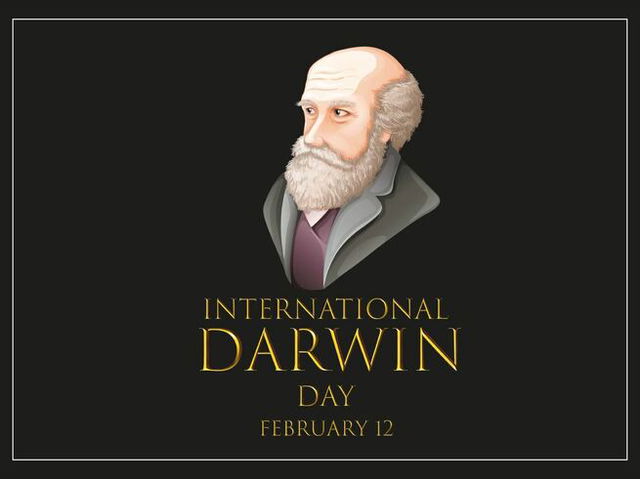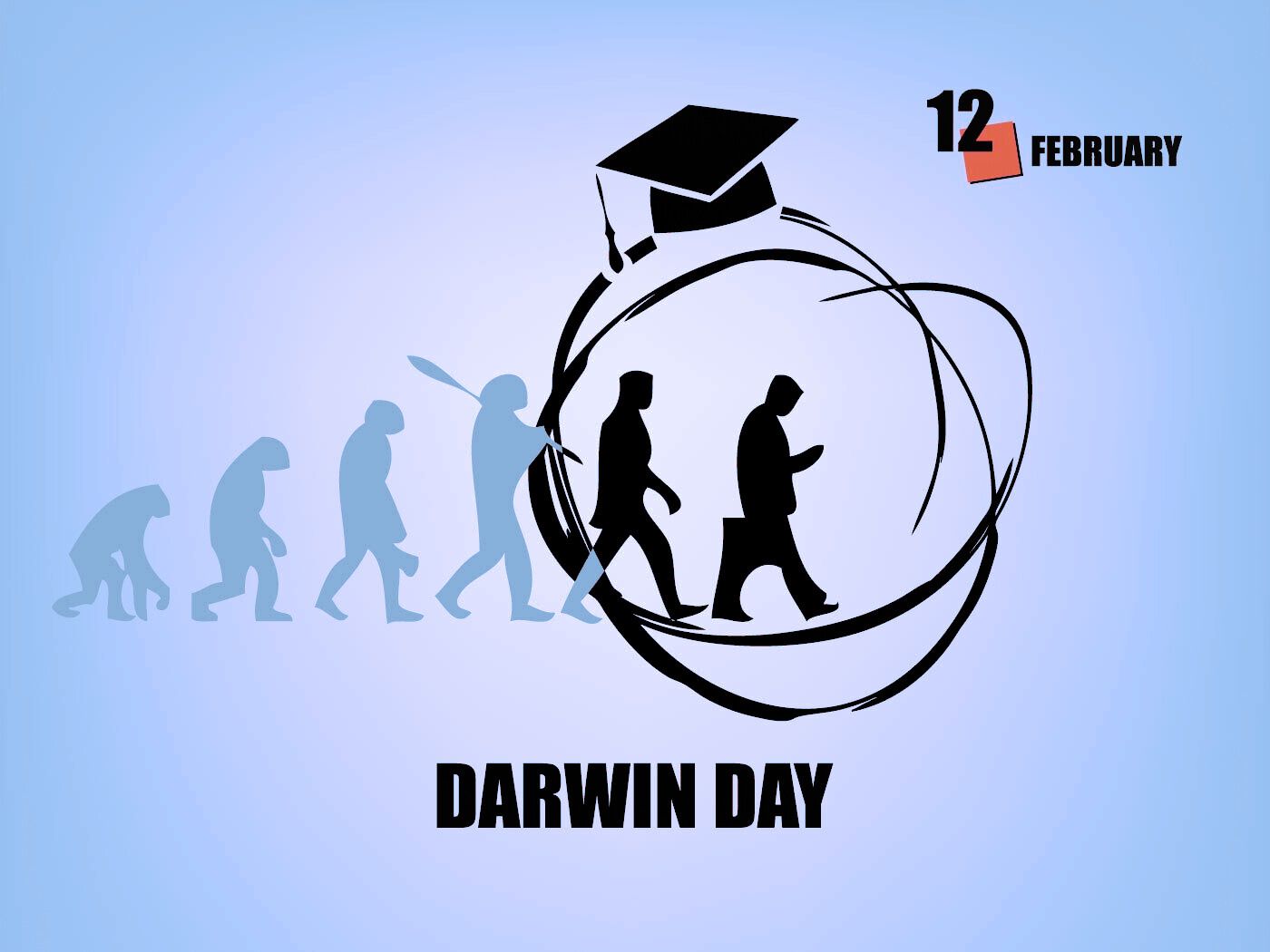- Calendar
- Calendar 2026
- February
- Darwin Day
Darwin Day
Darwin Day also known as International Darwin Day is observed every year on February 12 to honor the “Father of Evolution” on his birthday.
This day is a global tribute to Charles Darwin and his legacy that led to groundbreaking transformations in the world of science.
Darwin's theory of evolution by natures order of classification changed our understanding of life and the mutual dependence of all living beings forever.
His work not only revolutionized biology but also inspired generations to dive deeper and explore further. Whether you are an enthusiast of science, or a lover of the wonders of nature, Darwin's Day encourages you to celebrate the power of discovery and the impact he left on society.

History of Darwin Day
Darwin Day honors Charles Darwin's contributions to science and his groundbreaking work on evolution. Celebrations have taken place sporadically since his death on April 19, 1882, at age 73.
Events have been held at Down House, where Darwin lived for many years with his family.
In 1909, the 100th anniversary of Darwin's birth and the 50th anniversary of On the Origin of Species were celebrated worldwide.
A major event in Cambridge brought together over 400 scientists and dignitaries from 167 countries.
In the same year, the New York Academy of Sciences held an event at the American Museum of Natural History, unveiling a bronze bust of Darwin.
Over the years, universities and organizations have hosted Darwin-themed celebrations.
For example, the University of Chicago marked the centennial of On the Origin of Species in 1959, and Salem State College in Massachusetts has held a “Darwin Festival” annually since 1980.
The idea of Darwin Day as an official event gained momentum in the 1990s.
The Humanist Community in Palo Alto, California, hosted its first public celebration in 1995, and similar events followed at the University of Tennessee and other institutions.
The year 2009 marked the 200th anniversary of Darwin's birth, making it a significant milestone. Celebrations took place in Shrewsbury (Darwin's birthplace), Cambridge, and the Natural History Museum in London.
Highlights included the unveiling of a life-sized bronze statue of Darwin at Christ’s College, Cambridge, and the release of the film Creation, a biopic about Darwin's life.
In recent years, efforts to officially recognize Darwin Day have grown. U.S. Representative Pete Stark introduced a resolution in 2011 to designate February 12 as Darwin Day, calling it a time to celebrate science and humanity.
In 2013, Representative Rush Holt introduced a similar resolution, and in 2015, Delaware became the first U.S. state to officially mark the occasion.
Darwin Day continues to be a global celebration of science, evolution, and the impact of Charles Darwin’s work on humanity.
The Journey of Charles Darwin
Charles Darwin was born on February 12, 1809, in Shrewsbury, a small town in England. From a young age, he displayed a deep curiosity about the natural world, a passion likely inspired by his family's intellectual legacy.
Darwin’s father, Robert, was a respected doctor, and his grandfather, Erasmus Darwin, was a prominent scientist and thinker of his time. This lineage fostered a love for inquiry and exploration in young Charles.
At just 16 years old, Darwin entered the University of Edinburgh, initially studying medicine. However, his aversion to surgery and fascination with nature led him to explore other fields.
Two years later, he transferred to the University of Cambridge, where he studied natural history and developed a keen interest in botany under the guidance of his mentor, Professor John Henslow.
These formative years nurtured his scientific curiosity and prepared him for a life of groundbreaking discoveries.
In 1831, soon after completing his studies, Henslow recommended Darwin for an extraordinary opportunity: serving as a naturalist aboard the HMS Beagle.
The ship was embarking on a five-year voyage to survey and map the coasts of South America and other parts of the world. Although hesitant at first, Darwin accepted the offer, and the journey proved to be life-changing.
During the expedition, Darwin collected a vast array of specimens, including plants, animals, and fossils, from diverse ecosystems and remote locations.
He meticulously recorded his observations, particularly noting the variations among species on the Galápagos Islands. These differences would later serve as key evidence for his revolutionary ideas. The voyage not only broadened Darwin's knowledge of natural history but also sparked profound questions about the origins and adaptations of life on Earth.
After returning to England in 1836, Darwin dedicated himself to analyzing his findings. He published his travel experiences in The Journal of Researches, which became a popular scientific work.
Over the following years, he refined his groundbreaking theory of evolution by natural selection, which proposed that species evolve over time through a process of adaptation to their environments. In 1859, Darwin published On the Origin of Species, a book that fundamentally altered the way humanity understands life and its interdependence.
Despite facing criticism and resistance from some quarters, Darwin's work laid the foundation for modern biology and evolutionary science. His meticulous research and innovative thinking earned him widespread respect among scientists and naturalists.
Charles Darwin passed away on April 19, 1882, in London, at the age of 73. The exact cause of his death remains unknown, but his legacy endures as one of the most influential figures in the history of science.
He was laid to rest in Westminster Abbey, an honor that reflected the profound impact of his contributions to understanding the natural world.
Darwinism and the Theory of Evolution
Darwinism refers to the theory of evolution proposed by Charles Darwin, which explains how species evolve over time through natural selection.
According to this theory, organisms with traits that help them survive and reproduce are more likely to pass those traits to the next generation.
Over time, these small, inherited variations help species adapt to their environment. Darwin’s ideas were first published in his 1859 book On the Origin of Species, and they challenged traditional beliefs about the creation of life.
The term “Darwinism” was coined in 1860 by Thomas Henry Huxley, a strong supporter of Darwin’s work. It initially referred to Darwin's theory of natural selection, but over time, the term has also been used more broadly.
While the theory was groundbreaking, it faced criticism from those who did not accept the idea of natural selection, including some scientists who believed in other forms of evolution, such as Lamarckism.
In the late 19th and early 20th centuries, the theory was further developed into what is now known as the modern synthesis, which combines natural selection with genetic principles.
Today, the term “Darwinism” is often used to describe the scientific understanding of evolution, but it is sometimes used in a negative way, especially by creationists who reject the theory.
Some people also associate the term with the idea of “survival of the fittest,” which was coined by Herbert Spencer and applied to both biology and society. Despite these controversies, Darwinism has become an essential part of modern biology, shaping how scientists understand the development of life on Earth.
Darwin Day Activities
There are many events across the World and the United States to celebrate Darwin Day. There are workshops and lectures, debates, competitions, symposia, concerts, plays and poetry readings, exhibitions, and library displays. All of them have the purpose of spreading the work and legacy of Charles Darwin, and the ways in which his theory advanced science.
One of the most popular events of this day was founded in 2000 and is known today as the Darwin Day Celebration. This event, created by three academics, is committed to bringing science education to different countries.
You can celebrate this day by learning more about Charles Darwin and his work. Read On The Origin of Species, watch a documentary, or pay a visit to the closest natural history museum.

Other Celebrations
-
Apr 18 Fri
-
May 01 Thu
-
Sep 16 Tue
-
Sep 23 Tue
-
Apr 10 Fri
-
Sep 20 Sun

Darwin Day - Next years
Friday, 12 February 2027
Saturday, 12 February 2028
Monday, 12 February 2029











